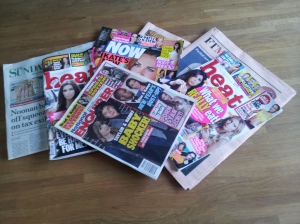Gillian Delany
Today’s world is media dominated. Whether you get your fix from print, online or through social media our opinions and beliefs have become molded by what the media deem acceptable and so too has our opinions on our bodies. It is because of this media intrusion that so many of our youths struggle with their body image today. Day after day in this celebrity obsessed world our children and young adults are bombarded with pictures of the A list stars of Hollywood and the high fashion models of the run ways. Magazines have become ridden with diet exclusives and new eating crazes. Cover stories seem to endlessly revolve around which celeb has lost or gained the most weight.
In recent years the media have come under serious pressure and criticism regarding how they influence our ideas of body image. Magazines and advertisers seem only to use the stick thin models to portray their idea of beauty. This has lead to an increase in body dissatisfaction. Many young people compare themselves to these images unaware of the air brushing and photo shopping that goes on behind the scenes. Many of the photos presented to the public have been enhanced or modified in some way to help the object appear more attractive. These idealized versions of the female and male physic in these fashion magazines, posters ,and celebrity culture have in some instances lead to excessive dieting , exorcise and eating disorders.
According to Healthy Place body image ‘revolves involves our perception, imagination, emotions, and physical sensations of and about our bodies’. The media with its great stance in our society can influence the positives and negatives feeling of our own self worth. Today’s youth are more vulnerable than ever before as in this social media era they are constantly hit with images of what the media call ‘the perfect figure or physique.
Tall Amazonian like models with long thin frames are used to advertise clothes, cosmetics, foods etc. When do we ever see a size 14 girl the national average size of regular height grace the covers of our favorite magazines or poses for top clothes brands. This is the problem. Teens have an unrealistic image of what is beauty, of what is perfect. They are subjected from day one that there is no room for imperfection, that it’s wrong and that they should do something about it.
TV programme have also played there part. These days one cannot turn on the TV without seeing some reality modelling programme or beauty pageant contest. I myself have become victim to the popular Americas Next Top Model and more recently Britain’s and Ireland Next top model. While sitting watching these shows parade around tall thin models critiquing there every move I too become all to aware of my own imperfections. I begin to feel as though I should look like them, like I should be exercising to look like them instead of just being comfortable in my own skin.
One now notorious season of the hit show saw model an extremely thin contestant win the show. One person commented saying that they could rap their hands completely around the 19 years olds waste. The model and show came under fierce criticism for the decision.The model and the show has since had to defend their choice stating that the winner ‘is not anorexic’ in okmagazine article.
However in recent years there has been a slight move in programme’s to help combat the problem of body confidence. Such programme’s as Super Size v Super Skinny and Gok Wans How to Look Good Naked are among the shows helping woman of all shapes and sizes find their confidence. Super Size v Super Skinny helps people who are either severely over or under weight, combat their problems and help them become comfortable in their own skin.
This clip shows Gok helping a woman who has feared her own reflection.
Although these shows are helping us stand up to the media’s perception of what is perfection it doesn’t go deep enough. With the rise of social media platforms such as Facebook and Twitter there is even more pressure for people to look and act certain ways. Our lives have become documented by nonstop photos, tags , and timelines.
Being a student myself I know the pressure to look and conform to a certain way. You are always aware of how you are perceived on your social networking site such as Facebook. One regularly goes through their pictures examining whether it is a good enough picture to you ‘tagged’ in it and if not you delete it. Looking at this you realize just how obsessed you become on your image.
Having looked into the influence of the media on my own image I asked some of my fellow students what they thought about the media and their influence over peoples body image. Many female students believed that the media was ruining the way young girls saw themselves. Miriam Mekki from DCU said the media was ‘intrusive and forcing an unrealistic view of body image on women’.
Over 70% of the girls I interviewed believed the media had played a huge part in how they have viewed there own body image.
Surprisingly many of the males I interviewed had a much different stance. The majority believed that the media only targeted women’s body image and that it did not affect males in their view of their body image. In the words of one student ‘the media doesn’t focus on men body image therefore it doesn’t effect my view of my own body.’



Leave a comment